
The Buenos Aires Underground, locally known as Subte, is a rapid transit system that serves the area of the city of Buenos Aires, Argentina. The first section of this network opened in 1913, making it the 13th earliest subway network in the world and the first underground railway in Latin America, the Southern Hemisphere, and the Spanish-speaking world, with the Madrid Metro opening nearly six years later, in 1919. As of 2023, Buenos Aires is the only Argentine city with a metro system.

Line A is the oldest line of the Buenos Aires Underground. Opened to the public on 1 December 1913, it was the first underground line in South America, the Southern Hemisphere and the Spanish-speaking world. It made Buenos Aires the 13th city in the world to have an underground transport service. The line stretches 9.8 km (6.1 mi) from Plaza de Mayo and San Pedrito and runs under the full length of the Avenida de Mayo and part of the Avenida Rivadavia, and is used by 258,000 people per day.

Line B of the Buenos Aires Underground runs 11.75 kilometres (7.30 mi) from Leandro N. Alem to Juan Manuel de Rosas in Villa Urquiza. Line B opened to the public on 17 October 1930.
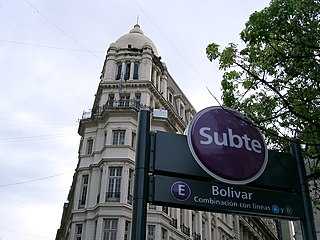
Line E of the Buenos Aires Underground runs from Retiro to Plaza de los Virreyes, a total distance of 12 km. Opened in 1944, the Line E was the last completely new line to be added to the Buenos Aires Underground, until 2007 when Line H was opened. The line has a history of being re-routed and extended due to having been historically the line with the lowest passenger numbers on the network.
Line G is a planned addition to the Buenos Aires Underground which has been on the drawing board in numerous forms since the 1930s. After a failed attempt at financing and building the line in 2009, its most recent proposal was put forward in 2015 by the government of Buenos Aires.

The Premetro is a 7.4-kilometer long (4.6 mi) light rail line that runs along the outskirts of Buenos Aires, connecting with the Buenos Aires Underground line E, at Plaza de los Virreyes station and then to General Savio, with a short branch to Centro Cívico. It opened in 1987 and is operated by Metrovías. Originally, the Premetro was to include many more lines, but shortly after the privatisation of the railways the projects were postponed and never materialised and only "Premetro E2" was built.

Federico Lacroze is an underground station on Line B of the Buenos Aires Underground named after the Argentine railway entrepreneur, located at the intersection of Corrientes and Federico Lacroze avenues in the Chacarita neighbourhood and near the La Chacarita Cemetery. The station was opened on 17 October 1930 as the western terminus of the extension of the line from Federico Lacroze to Callao.

Los Incas - Parque Chas is a station on Line B of the Buenos Aires Underground. The station was opened on 9 August 2003 as the western terminus of the extension of the line from Federico Lacroze. It remained the terminus of the line until the opening of Juan Manuel de Rosas station on 26 July 2013.

Tronador - Villa Ortúzar is a station on Line B of the Buenos Aires Underground. The station was opened on 9 August 2003 as part of the extension of the line between Federico Lacroze and Los Incas - Parque Chas.

Dorrego is a station on Line B of the Buenos Aires Underground. The station was opened on 17 October 1930 as part of the inaugural section of the line between Federico Lacroze and Callao.
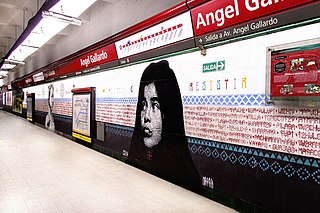
Ángel Gallardo is a station on Line B of the Buenos Aires Underground. This is the station for Parque Centenario and the Natural History Museum.

Medrano is a station on Line B of the Buenos Aires Underground. The station was opened on 17 October 1930 as part of the inaugural section of the line between Federico Lacroze and Callao.

Carlos Gardel is a station on Line B of the Buenos Aires Underground.

Pasteur - AMIA is a station on Line B of the Buenos Aires Underground. It was opened on 17 October 1930 as part of the inaugural section of the line between Federico Lacroze and Callao.
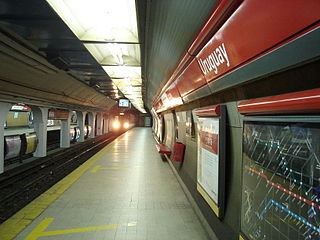
Uruguay is a station on Line B of the Buenos Aires Underground. It is located at the intersection of Avenida Corrientes and Calle Uruguay, near to the Courthouse and in the middle of the city's main theatre district. The station was opened on 22 July 1931 as part of the extension of the line from Callao to Carlos Pellegrini.
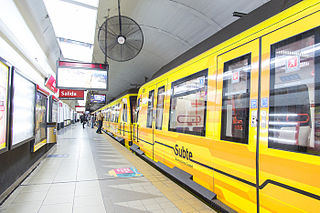
Florida is a station on Line B of the Buenos Aires Underground. The station was opened in December 1931 as part of the extension of the line from Carlos Pellegrini to Leandro N. Alem.

The Buenos Aires Metrobús is a 50.5 km (31.4 mi) network of dedicated separated lanes and stations for buses that serve the city of Buenos Aires, Argentina. Designed as a Bus Rapid Transit system, it mixes a few bi-articulated buses with conventional buses. The headway is the same as before the implementation of the system, and the buses on the system use the same brand as the main network, that is, maintaining their previous branding as common bus lines with their own numbers. The service operates 24 hours a day and 365 days a year, with 2-4 minute frequencies during the day and 10–15 minutes at night.

The Regional Express Network was a planned commuter network system in Buenos Aires, which consisted in an underground connection among the 3 mainline railway stations of the city: Retiro, Constitucion and Once, in the north, south and west respectively.
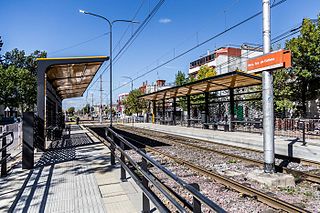
Nuestra Señora de Fátima is a station on the Buenos Aires Premetro. It was opened on 13 March 2000 by the Buenos Aires Underground operator Metrovías and is one of only two Premetro stations to have been opened after the original inauguration of the Premetro in 1987. The station is located in the Barrio of Villa Soldati.
The Buenos Aires Underground has one of the most diverse metro fleets in the world, and has had some of the oldest models in operation on any network. The network began with a relatively standardised fleet, but throughout its over 100-year-long history, it has seen numerous purchases which have created cases where some lines operate numerous models. Recently there have been increased efforts to modernise and standardise the fleets, with large purchases from China CNR Corporation and Alstom.

















